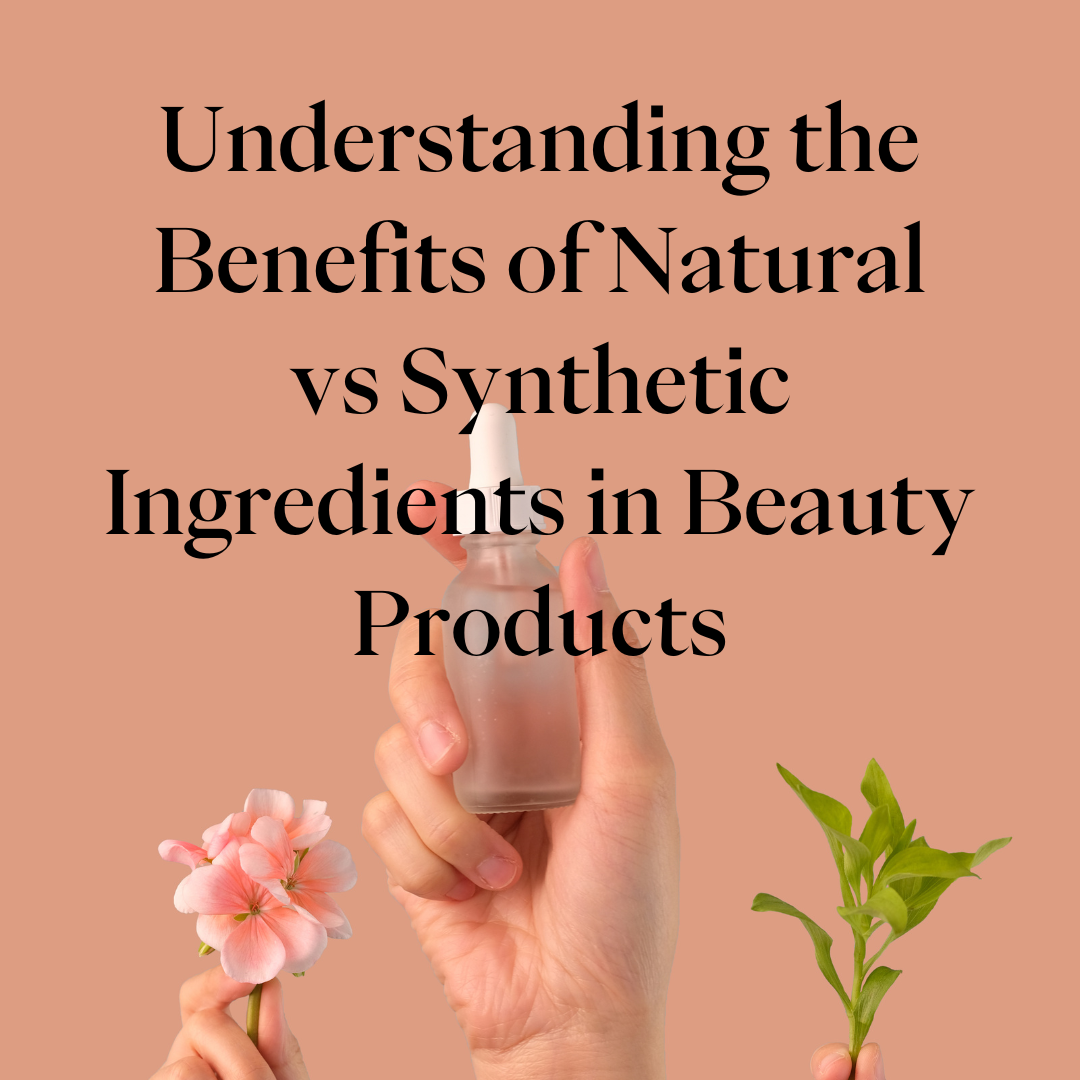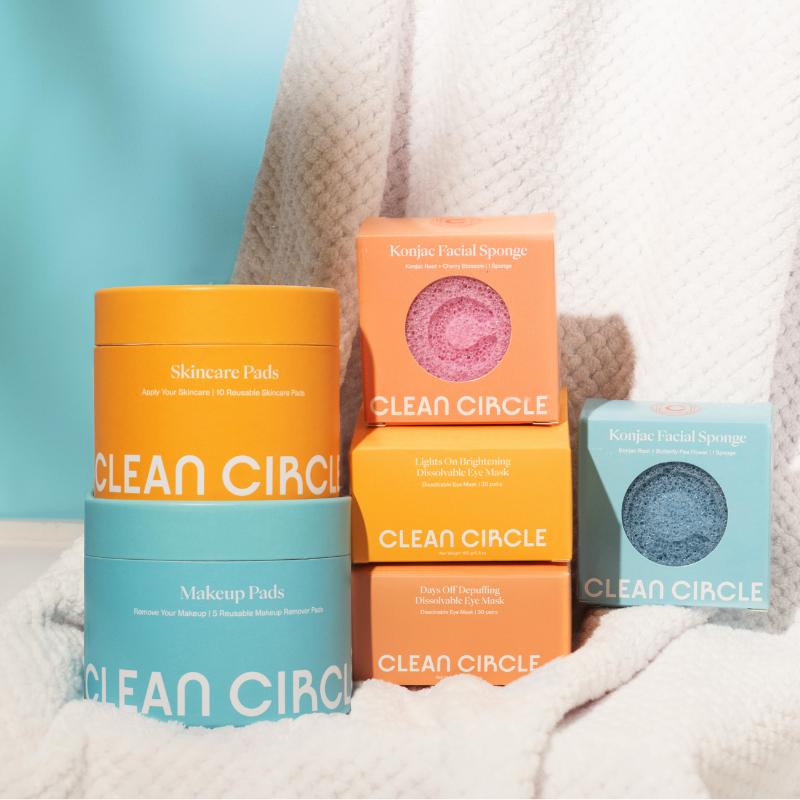
Understanding the Benefits of Natural vs Synthetic Ingredients in Beauty Products
Share
Understanding the Difference between Natural and Synthetic Ingredients in Beauty Products
As more people become more health-conscious about what they eat, it's becoming more common (and even normative) to question the ingredients in our cosmetics and skincare. And, as natural skincare has grown in popularity, many consumers have expressed concerns about its counterpart: synthetic skincare. However, advice from the two camps: scientific and lab-based (i.e. chemical) or eco-friendly and plant-based (i.e. natural) appears to be bouncing around in different directions.
What are Synthetic Ingredients in Beauty?
Synthetic cosmetics are produced from laboratory-formulated products. Consider synthetic to be another word for "artificial" or "man-made." Synthetic products are frequently derived from natural sources, such as hyaluronic acid, which is used in the cosmetics industry.
Synthetic ingredients are sometimes engineered to look like natural ones. Vitamin C is just one example of a naturally occurring ingredient that has been successfully replicated in the laboratory. Some examples of synthetic cosmetics are natural ingredients that have been replicated in labs.
What's the Difference Between Natural and Synthetic Ingredients?
Natural vs Synthetic Ingredients in Cosmetics
In the battle between natural skin care vs synthetic skincare, each has pros and cons. So, what are advantages and disadvantages of natural vs synthetic products in cosmetics and skincare?
While the term "natural" is unregulated, not all products with the word "natural" on their labels are deceptive. Study the ingredients first. Remember that ingredients are listed in decreasing percentages, so choose a product with synthetic ingredients near the bottom of the list, if at all.
Here's where things get complicated: the scientific names of some naturally occurring ingredients may sound synthetic. For example, sodium chloride is just sea salt, and citric acid is a compound found in lemons and other citrus fruits. Not to worry; with practice, you'll be able to identify these. Furthermore, as you'll see, there are other ways to ensure your product is environmentally friendly.
In theory, a "synthetic-free" product contains no man-made ingredients at all—it is entirely composed of naturally occurring elements or compounds. The term "plant-based" is a little more flexible, but it generally indicates that the product is made with botanical ingredients. Both are unregulated terms. Still, keep in mind that a product can be synthetic-free but not organic, and vice versa, just as kale isn't always organic.
On the other hand, "synthetic ingredients in skincare" refers to products that contain laboratory and scientifically derived ingredients such as hyaluronic acid. The formulas are created using chemical copies of natural ingredients.
Although all cosmetics contain some form of preservative, synthetic cosmetics almost always have a longer shelf life than their all-natural counterparts. This results in less packaging waste. Lab-derived ingredients also frequently have a lower environmental footprint than natural ingredients. Natural products necessitate massive resource consumption, such as land and water for plant crops, as well as pollution from transportation. Synthetic ingredients examples such as hyaluronic acid and lab-made dye are frequently less expensive to produce than natural ones, and these savings are passed on to the consumer.
Which is Better for My Skin?
With so many skincare products on the market that claims to be naturally made, it can be difficult for the consumer to keep track of it all. The natural versus synthetic camps have somewhat polarised the industry, with some claiming natural products are ineffective and others claiming synthetic products are harmful. But are synthetic ingredients really bad? The truth is most likely somewhere in the middle.
When properly formulated, naturally derived products can be extremely effective; however, natural does not always imply superior; poison ivy is also natural. Synthetic products, because they are created in a laboratory, are not inherently dangerous, and many may be biologically active.
Natural alternatives have historically struggled to compete with lab-grown chemicals in terms of performance and efficacy, but this has changed. Natural ingredient formulation has come a long way. Natural beauty products were not nearly as sophisticated or high-tech. Because of this, natural products have traditionally been thought to perform poorly, but there are now some extraordinary natural ingredients available now.
The widespread assumption about the chemicals used in products is the result of "chemophobia." Part of the problem stems from an inherent fear of what we don't know, especially because long chemical names on product labels can be confusing.
Both natural and synthetic skincare have advantages, and much depends on personal preference. If you find something that works for you, whether synthetic or natural, stick with it. It's also acceptable to mix and match products. Although synthetic serums with active ingredients may be more effective, you may prefer to follow your serum with a naturally derived emulsifier. When shopping for naturally-derived products, keep in mind that repeated exposure to air, light, and/or heat may degrade certain ingredients. The use of opaque packaging in pumps rather than jars will help to reduce exposure to the elements while also preserving potency. Alternatively, you could simply look for brands that combine the best aspects of both.
How to Read Ingredients on Ingredient Labels
Unlike in the food industry, there is no regulation governing the use of the terms "natural" and "organic" in the beauty industry. In fact, many companies use this terminology to describe products with ingredient lists that cannot be verified.
The lengthy ingredient list on the back of a bottle or carton? It's known as the INCI, and it's essentially a complete list of every single ingredient in the product.
The acronym INCI stands for 'International Nomenclature of Cosmetic Ingredients' and isn't as complicated as it sounds. To ensure consistency across brands, product types, and countries, all brands must follow the same rules when telling consumers what's in their products, which should make reading your skincare ingredient labels easier.
Make sure to read and research all the ingredients of the products you are about to buy and use as this can heal or harm your skin.
Reference
https://www.glamourmagazine.co.uk/article/difference-between-natural-and-synthetic-skincare
https://www.byrdie.com/natural-vs-organic-beauty-products
https://www.100percentpure.com/blogs/feed/natural-vs-synthetic-skincare-what-s-the-difference

